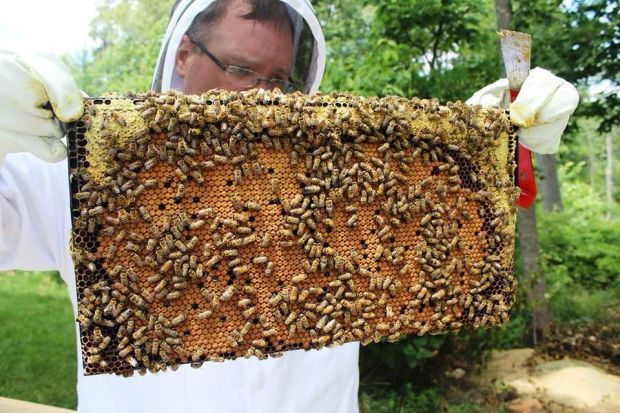Whenever people ask Butler’s Pantry’s chef de cuisine Chuck Friedhoff why he makes his own natural honey, his first response is always in jest.
“I tell them, ‘I don’t make the honey; the bees do,'” he says.
Friedhoff and his wife and Rhubarb and Honey blogger, Kimberly Henricks-Friedhoff, currently have a full hive. They started out with a quarter hive with a queen, called a nuc (pronounced nuke) in beekeeper slang, that was gifted to Friedhoff by Kimberly and her parents for his birthday in January.
Friedhoff always felt the draw of natural beekeeping as a proponent of the slow food movement and taking the extra time to monitor what goes into your body. After the apartment-dwellers finally moved into a house big enough to raise bees in October 2012, it was an obvious next step.
Friedhoff and his wife took a natural beekeeping class at Local Harvest through Isabees last June, and they soon found themselves amazed at the technicality and preciseness of the bee’s work.
“We couldn’t believe how well they manage themselves,” Friedhoff says. “There’s a queen, obviously, but they can tell if she’s doing a poor job and will start rearing a new queen. There are bees specifically for cleaning cells, for making honey, for capping honey, for making comb. Every bee has its place.”
Friedhoff and his wife manage their hive in the backyard of their home near Fenton, where their duties include checking the bees and screen bottoms for mites, monitoring the eggs, grooming the bees when necessary and much more.
They use photography to minimize the amount of time they spend in the hives for inspection. Zooming in on the photos on their computer allows them to see almost as much detail as in person, but it doesn’t disrupt the bees’ work.
Using photography, they’ve occasionally discovered mites on their bees, which is a backyard beekeeper’s biggest pest – literally. Mites, by comparison, would be the equivalent to a frisbee-sized tick on a human, and are an ongoing issue with beekeeping.
“It’s a question of when, not if, your bees are going to get mites,” Friedhoff says.
Friedhoff controls the mites on his bees with natural essential oils rather than chemicals to get rid of mites, adding spearmint, lemongrass and – when the mite numbers get too high – thyme, to the simple syrup of the bees’ feed to combat the mites, rather than harmful chemicals. The mites dislike the ingredients in the essential oil, so they find something else to latch on to. The thyme is more aggressive and actually kills the mites, so it’s used less often to protect the bees, as well.
This process is one of many that Friedhoff uses to ensure that his beekeeping is done naturally. He sprays olive oil on the solid boards underneath the screen bottoms of his hive to catch the debris that falls for 24 hours once per month. Any pesticides he uses are organic.
“Beekeeping in itself is unnatural,” Friedhoff says. “Bees in nature find a tree for their hive, not man-made boxes. I believe that raising natural bees helps them manage themselves and makes a stronger bee.”
For him, it’s not about the honey being produced. Of course that’s important, but Friedhoff would rather raise a hive that can support itself and grow large and healthy over the years. This past spring, he didn’t even cultivate any honey so that the bees would have enough for themselves to make it though this winter. Plus, there would be less need for them to gather and build up in the spring.
Next spring will be the first time Friedhoff will be able to taste the honey his bees make. The first year, he plans on giving away about half of his honey to neighbors and friends who have put up with his hive. Eventually, though, the plan is to raise hives at or near Butler’s Pantry to use the honey in cooking.
“The true sign of a strong hive is the ability for a colony to split itself, or what we call swarming,” Friedhoff says. “So this spring we’re hoping that process will happen and eventually can set up these split hives somewhere at Butler’s Pantry.” Butler’s Pantry currently uses local honey from Double Star Farms in Bluford, Illinois.
One of the new friends Friedhoff has made is Ralph Samples, his bee mentor and fellow hive-owner. Friedhoff found Samples, who maintains about 40 hives, on a Facebook forum for Missouri beekeepers, and he’s been instrumental in keeping Friedhoff’s hives running smoothly.
“There’s no right answer for beekeeping,” Friedhoff says. “There’s a joke that if you ask 10 beekeepers the same question, you’ll get 20 different answers. Ralph is always there if I have a question, but he makes sure I’m doing my own research and usually answers my question with a question.”
Backyard beekeeping has been a project in patience, but it’s also a calming and rewarding hobby for Friedhoff and his wife.
“I lose track of time sitting and watching the bees,” he says. “It’s mesmerizing to see them at work.”
Butler’s Pantry, 1414 Park Ave., Lafayette Square, 314. 664.7680, butlerspantry.com
